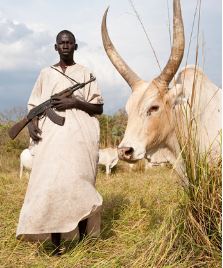The conflict between Equatoria’s farming and Dinka Bor pastoralist communities keeps evading public discourse yet remains a chronic tragedy that recurs. Although it has regrettably claimed many innocent lives, there is a silver lining. I am optimistic that there are long-lasting solutions if we choose to pursue honest discussions with sobriety.
There have been efforts from South Sudan’s top leadership previously, unfortunately, the solutions offered left a lot to be desired. Notably, when clashes occurred in 2017, President Salva Kiir’s preferred solution was to order the national army to eject Dinka Bor pastoralists from Equatoria altogether. Similarly, in the wake of the recent carnage in Magwi County, Eastern Equatoria State Governor Louis Lobong went a stretch as far as inciting the local youths to mobilize against their fellow citizens. Such emotionally charged simplistic solutions are not only irresponsible and dangerous but also cultivate irreparable hate and ethnic profiling between tribes.
I strongly believe that contact between South Sudanese tribes is healthy, both socially and economically, if explained to communities responsibly and in good faith. Therefore, avoidance and bloodshed scantly provide meaningful fixes. There are better remedies to these problems and can only be realized if we critically analyze circumstances unique to each tribe and identify how they complement each other.
For example, Dinka Bor pastoralists have their land, however, it is also home to the Sudd –Africa’s largest freshwater wetland. The Sudd is arguably a treasured national resource to all, including Equatoria’s farming communities, once we get a government willing to invest in it. The devil in the detail, however, is that it brings floods seasonally. This forces Dinka Bor, one of the national sources of dairy products, to move their cattle to drier parts of their neighbors to avoid their animals contracting waterborne diseases. On the other hand, the farming communities in Equatoria are almost exclusively the national basket of fresh farm produce, suggesting that their farms equally require protection. Put together, this forms a critical national symbiotic relationship that can benefit everyone if exploited without the haze of identity politics.
Our leaders seem to either lack this understanding and/or are cynically turning a blind eye to easy concepts to grasp. Either way, it has only kept exacerbating the tragedies we have all witnessed so far. Moreover, it has spilled over and is already showing its ugly head in the realms of social media where unwitty populists see the world only in black and white. One of the two fallacies floating around the internet these days, for instance, is the notion that Dinka Bor sons died during the liberation struggle in Equatoria and, therefore, are entitled to unlimited access. I strongly disagree with this logic. I am old enough to know that they did not take up arms for a license to roam neighbours’ backyards without consent, but to liberate a country. The other fallacy is the assertion that Dinka Bor pastoralists are coming to Equatoria to “occupy our land”. On the contrary, I also find this claim outlandish for a couple of reasons. First, South Sudan’s liberation was a collective effort. It was not a “one man protects their own backyard” struggle. Otherwise, we would never have had the country we have today. That is why, by law and/or by common sense, a South Sudanese has a right to own land anywhere in South Sudan if they acquired it legally. Secondly, Dinka Bor pastoralists are seasonal migrants who I doubt are looking for permanent settlement. Even if they do, it still will require consent from local communities by law. So, let us allow reason to reign over this outrageous unfounded hate.
I implore local leaders from both communities to take responsibility –rather than relying on the whims of ruling elites and their minions –to educate communities on the importance of interactions, make comprehensive plans before any contacts, and define how long those contacts last each year to avoid destructive frictions. As communities, we have a citizenship responsibility to accommodate and respect each other’s properties in the sole interest of our mutual benefits. Moreover, we have a lot much more to gain than lose if we see each other in terms of what we can exchange rather than our identities.
Otherwise, if we keep resisting co-existence, we will forever remain political pawns to the ruling elites in Juba who are desperate to evade our collective scrutiny. And guess who loses? All of us!
Mathiang is a doctoral student in Neuroscience and Behavior at the University of Windsor, ON, Canada, and can be reached via mathian@uwindsor.ca.
The views expressed in ‘opinion’ articles published by Radio Tamazuj are solely those of the writer. The veracity of any claims made is the author’s responsibility, not Radio Tamazuj’s.




